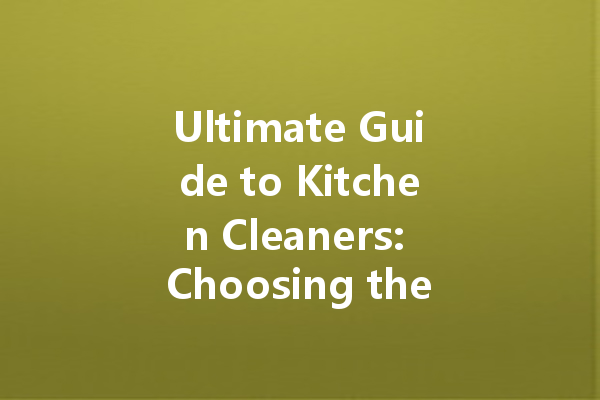Introduction
Keeping your kitchen clean is not only essential for maintaining hygiene but also for ensuring that the food you prepare is safe and delicious. With a plethora of cleaning agents available on the market, it can be overwhelming to determine which ones are the best for cleaning food and beverage surfaces. In this guide, we will explore various kitchen cleaners, their characteristics, and how to choose the right products for your needs.
Types of Kitchen Cleaners
All-Purpose Cleaners
All-purpose cleaners are versatile solutions designed to tackle a variety of surfaces, from countertops to appliances. They are effective in removing grease, grime, and food particles. Look for cleaning agents that are labeled as safe for food contact surfaces to ensure they won’t leave harmful residues.
Disinfectants
Disinfectants are essential in the kitchen, especially for areas that often harbor bacteria, like cutting boards and sinks. These products typically contain antimicrobial agents that kill germs and viruses. When selecting a disinfectant, ensure it’s safe for food preparation areas. Many brands offer disinfectants specifically formulated for kitchens.
Specialized Cleaners
Some areas in your kitchen may require specialized cleaners. For example, oven cleaners are designed to break down tough grease and burnt-on food remnants, while stainless steel cleaners can help restore the shine to your appliances. Always follow the manufacturer’s instructions for the best results.
Eco-Friendly Cleaning Agents
Green Cleaning Products
For those who are environmentally conscious, eco-friendly cleaning products are an excellent choice. These products use natural ingredients and avoid harsh chemicals, making them safer for both your family and the planet. Look for certifications, such as Green Seal or EcoLogo, to ensure the product meets environmental standards.
DIY Cleaning Solutions
Creating your own cleaning solutions can be an effective and economical alternative. Common household items like vinegar, baking soda, and lemon juice can all be used to clean and disinfect kitchen surfaces. For example, a solution of equal parts vinegar and water can effectively clean countertops and appliances, while baking soda can tackle tough stains.
Health and Safety Considerations
Non-Toxic Formulations
When choosing a kitchen cleaner, prioritize non-toxic formulations, especially if you have children or pets. Products without harsh chemicals are less likely to cause respiratory issues or skin irritations. Always read labels to avoid substances like bleach, ammonia, or phthalates.
Proper Usage
It’s crucial to use cleaning agents according to the manufacturer’s instructions to maximize their effectiveness and ensure safety. Always use cleaners in well-ventilated areas and wear protective gloves when necessary. Be cautious about mixing different cleaning agents, as this can create hazardous reactions.
Evaluating Effectiveness
Cleaning Agent Performance
Not all cleaning agents are created equal. When evaluating a cleaning product, consider its performance on various surfaces. You can often find customer reviews online that provide insights into how effective a product is in real-world scenarios.
Cost versus Value
While price is an important factor, it shouldn’t be the sole consideration. Sometimes, spending a little extra on a high-quality cleaner can save you time and effort in the long run. Investing in effective cleaning agents can lead to a cleaner, safer kitchen environment.
Conclusion
Choosing the right kitchen cleaners involves understanding the various types available, prioritizing safety, evaluating their effectiveness, and considering eco-friendly options. By making informed decisions, you can maintain a hygienic kitchen that is not only safe for food preparation but also pleasant to work in. Remember, the importance of cleanliness in the kitchen cannot be overstated, as it plays a crucial role in the health and well-being of you and your family.

